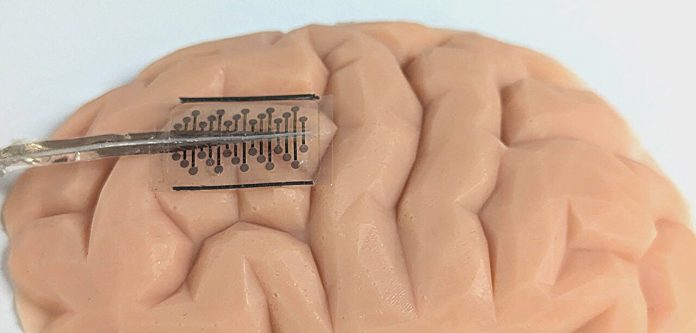
A team of researchers from the University of Oxford and the University of Cambridge has developed innovative ‘origami-inspired’ brain electrodes that could drastically reduce the need for invasive brain surgery.
This breakthrough could benefit people with conditions like epilepsy or those who need brain-computer interfaces, making the treatment process less risky and more efficient.
To treat conditions such as epilepsy, doctors often need to measure electrical activity in the brain.
Currently, this requires a large section of the skull to be removed so that electrodes can be placed directly on the brain’s surface.
This procedure, known as a craniotomy, is highly invasive, involves a long recovery period, and comes with significant risks, such as infection.
The study, published in Nature Communications, introduces a new type of brain electrode inspired by origami, the Japanese art of paper folding.
These electrodes can fold up to a much smaller size, reducing the area of the skull that needs to be opened by about five times. Despite the smaller incision, the electrodes work just as effectively as traditional ones.
According to Associate Professor Christopher Proctor from the University of Oxford’s Department of Engineering Science, this new approach allows doctors to access large areas of the brain through a much smaller surgical opening.
He believes this could be a game-changer for epilepsy patients, offering a less invasive diagnostic tool.
Additionally, the minimally invasive nature of these electrodes could open up new possibilities for brain-machine interfaces.
The device, when fully unfolded, looks like a thin, flat silicone wafer with 32 embedded electrodes attached to a cable. The wafer is incredibly thin, about the width of a human hair. Before surgery, it is folded up like an accordion, allowing it to fit through a small slit just 6 mm wide.
Once inside the skull, a pressurized fluid in the device inflates it, unfolding the wafer to cover a large area of the brain, up to 600 square millimeters.
In comparison, using a non-folding device of the same size would typically require a much larger section of the skull to be removed. The researchers tested the new device on anesthetized pigs and found that it could accurately detect and record brain activity, proving its functionality.
The research team hopes to begin testing these foldable electrodes in human patients within a few years. Epilepsy, which affects around 50 million people worldwide, is one condition that could benefit from this technology. The World Health Organization notes that people with epilepsy have a risk of premature death that is up to three times higher than the general population.
Dr. Lawrence Coles from the University of Cambridge, the lead author of the study, says that the team is currently working with clinical partners to refine the design for human trials. Beyond epilepsy, these foldable electrodes could also be used to diagnose and treat other brain conditions that cause seizures, such as certain brain tumors.
Moreover, this technology could reduce the amount of surgery needed to install brain-computer interfaces, which could be life-changing for people with disabilities.
Dr. Coles highlighted that one particularly exciting application of this technology is in direct speech decoding, where electrodes measure brain signals to help translate what a person is trying to say.
Professor Ley Sander, a neurologist from UCL and medical director at the Epilepsy Society, welcomed the development, noting that any technology that reduces the risks and recovery time of brain surgery is a positive step forward.
While the technology is still in its early stages, it offers real hope for safer and less invasive brain surgeries in the future.
If you care about brain health, please read studies that eating apples and tea could keep dementia at bay, and Olive oil: a daily dose for better brain health.
For more health information, please see recent studies what you eat together may affect your dementia risk, and time-restricted eating: a simple way to fight aging and cancer.



